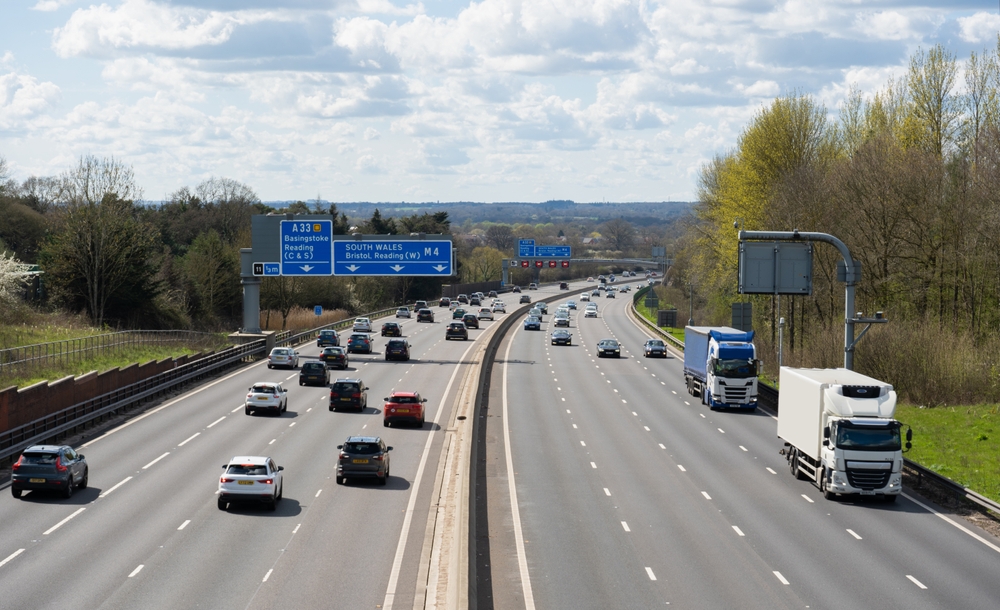Could the next car you buy come from Ireland? Maybe you’re returning to the UK and bringing your Irish car with you?
Either way, you’ll need to know how to import your vehicle so that you follow the correct procedures to legally drive on UK roads.
Here, we’ll run through the full process and cover everything from shipping and registration to the cost of importing a car from Ireland to the UK.
Can You Import a Car from Ireland to the UK?
Yes, it’s common to import a car from Ireland to the UK. There are specific rules to follow when importing vehicles to the UK and paperwork to complete, but other than that, it’s a straightforward process.
First, you’ll need to confirm the vehicle complies with UK environmental and safety regulations, which we cover later in this guide. Most Irish cars meet UK standards, and as long as they’re registered in the EU, all you’ll need is a European Certificate of Conformity from the manufacturer.
If you’re importing a left-hand drive vehicle, you must also obtain a GB Conversion Individual Vehicle Approval (IVA) to drive on British roads.
From shipping your car from Ireland to the UK to arranging specialist import car insurance, follow our guide.
Your Guide to Importing a Car from Ireland to the UK
The process for importing a car from Ireland to the UK can be broken down into six key stages. These stages are designed to ensure your vehicle complies with safety regulations and meets all the legal requirements for driving on British roads.
Here’s what you should do:
1. Find and Purchase Your Vehicle
Buying a vehicle in Ireland is no different to the UK. You can visit dealerships, car auctions or private sellers to find the best deal.
Being on the ground also allows you to inspect the car in person before making a purchase. If you’re unable to travel to Ireland, you could also find someone local to inspect the vehicle on your behalf to ensure it meets the description you’ve been given.
It’s beneficial to have your finances arranged in advance to avoid any purchasing delays or missing out to a rival bidder. Always read the small print before committing to identify any hidden costs and fees you weren’t expecting.
If you’re buying your Irish vehicle online, here are four things to look out for:
- Avoid scams: Do your homework on the seller to make sure they’re legitimate and not professional scammers.
- Inspect the vehicle: Visit Ireland in person or arrange for someone local to examine the vehicle on your behalf. They can send you photos of any imperfections or damage and even arrange a test drive on your behalf.
- Read the small print: Study the purchase contract thoroughly before transferring funds to avoid nasty surprises and hidden fees.
- Use a secure payment method: When you are ready to pay a deposit or transfer funds, use a trusted and secure method.

2. Hire a Reputable Shipping Company
After purchasing your vehicle, the other major cost of importing a car from Ireland to the UK is shipping.
While you may be tempted by the cheapest option, it’s more important to find a reputable shipping specialist so that your car arrives safely and undamaged with all the correct paperwork in place.
Some shipping firms will charge a fee to collect your vehicle from most Irish locations before shipping it over. You may also want to take photos of the vehicle before it leaves Ireland to check for potential damage during transportation.
When hiring a shipping company, we recommend you look for the following:
- Specialist vehicle importer: Find a company with international vehicle shipping experience, ideally from Ireland to the UK
- Insurance cover: Make sure the vehicle is insured for any damage caused during transportation
- Be transparent with fees: Be aware of all upfront fees and costs
- Read customer reviews: Check customer ratings and reviews of the shipping company
Most imported cars from Ireland arrive by shipping container. Some shipping companies also allow you to store spare parts inside the vehicle, which is beneficial for classic car restoration projects where parts are hard to find.
When your vehicle is ready to be shipped over, you’ll have three main options:
| Roll on, roll off service | Shared container service: | Private container service: |
|---|---|---|
| The car is driven into the ship’s cargo area, secured alongside other vehicles, and driven off it when it reaches the UK port. This is one of the cheapest and most popular options, but there could be a risk of damage occurring when in transit. | Your car will be stored in a secure container along with other vehicles and items for export. Costs are shared between all users, but the process can take longer as you may need to wait until the container is full before it’s ready for shipping. | Your car alone will be stored in a container. This is the most secure and expensive option as you’ll need to pay for all the costs yourself. However, the process is generally quicker as the container can be shipped at any time. |
The cost of shipping a car from Ireland to the UK depends on the option and company you choose. However, you should expect to pay around 500-800 euros for this service, and it’s likely to take 1 to 2 weeks for the vehicle to arrive on UK shores from Ireland.
3. Get the Paperwork in Order
You’ll need to provide some vital paperwork so that your imported vehicle clears UK customs before you register it with the DVLA and insure it.
Here’s what you’ll need:
| Name of document | Where to find it |
| Import declaration | The Customs Handling of Import and Export Freight (CHIEF) system. Shipping firms can arrange this for you |
| Proof of ownership / invoice or Bill of Sale for the vehicle | Car dealership/private seller |
| Proof of insurance in Ireland | Car dealership/private seller |
| Shipping note or Bill of Landing (BOL) | Your chosen shipping company |
| Proof of insurance in the UK | Import car insurance provider |
| Evidence of vehicle modifications | Car dealership/private seller |
| Vehicle Registration Certificate (VRC) or VIN/chassis number | Car dealership/private seller |
| European Certificate of Conformity | Car manufacturer |
| GB Conversion Individual Vehicle Approval Vehicle Individual Approval (IVA) | DVLA |
| Photo ID | Your passport or photo driving licence |
4. Tell HMRC Within 14 Days of Your Car Arriving
Once you’ve secured custom clearance, you have 14 days in which to inform HM Revenue and Customs (HMRC) of the car’s arrival in the UK. You can do this online through the Notification of Vehicle Arrivals (NOVA) online service, or by filling in matching paperwork.
The following charges also apply:
- Tax and VAT at 10% of the total value of the car plus an additional 20% VAT
- 5% VAT for cars over 30 years old that won’t be your daily driver. Tax should be waived.
5. Register Your Imported Vehicle With DVLA
When HMRC knows that your imported vehicle has arrived, you’ll receive confirmation that it’s ready to be registered with the Driver and Vehicle Licensing Agency (DVLA). You’ll need to fill in forms and provide supporting documents, and DVLA may also ask to inspect the vehicle.
Here’s a checklist of what you’ll need:
| A V55/5 application form, or form V267 for new vehicles. | Your name/address using a passport or photo driving licence. |
| Pay imported vehicle tax to HMRC. | Utility bill showing proof of address. |
| Original foreign registration documents. | Proof of business address if importing a car through a business. |
| Certificate of insurance using the Vehicle Identification Number (VIN). | Invoice from the vehicle supplier/seller. |
| Vehicle MOT certificate. | Evidence of Type Approval (Certificate of Conformity/Mutual Recognition Certificate/V5C form or evidence of previous registration. If none are available, proof of Individual Vehicle Approval (IVA) will be required. |
| £55 registration fee. |
Please note that it can take up to 6 weeks for your V5C registration certificate to arrive for your imported vehicle. You cannot drive your imported car on UK roads until then and could face prosecution if you do so. The only exceptions are if you’re driving to an IVA test or pre-booked MOT, and you’ll need to produce evidence of this.

6. Prepare Your Imported Car for UK Roads
You’ve shipped your car over from Ireland, cleared customs, and followed the registration process – now you’ll need to make sure it’s safe and road legal in the UK. This means:
- Getting a UK number plate.
- Insuring your imported vehicle.
- Paying Vehicle Excise Duty (VED).
- Getting an MOT.
Once all that is done and you don’t need to make any drastic alterations to the vehicle, you’re free to legally drive your imported car on UK roads.
What are the Pros and Cons of Importing a Car from Ireland to the UK?
There are many reasons people choose to import a car from Ireland rather than buy it in the UK, and also potential drawbacks:
Pros of Importing a Car from Ireland:
- Access to a wider vehicle market and more deals, so potentially cheaper than a UK car, even with shipping, taxes, and charges factored in
- Some models may be easier to find in Ireland than in the UK due to higher market demand
- EU-registered, so unlikely to require extensive testing and modifications to meet UK standards
- Fast import and registration process
Cons of Importing a Car from Ireland:
- Time-consuming process and inconvenience of paperwork and documentation
- Parts, repairs, maintenance and servicing can be difficult for imported rare models
Are You Importing a Car from Ireland to the UK?
Before you take the high road, you’ll need specialist insurance for imported vehicles to legally drive in the UK. At Keith Michaels, we have vast experience in providing policies that meet your vehicle import needs. Contact us today.


